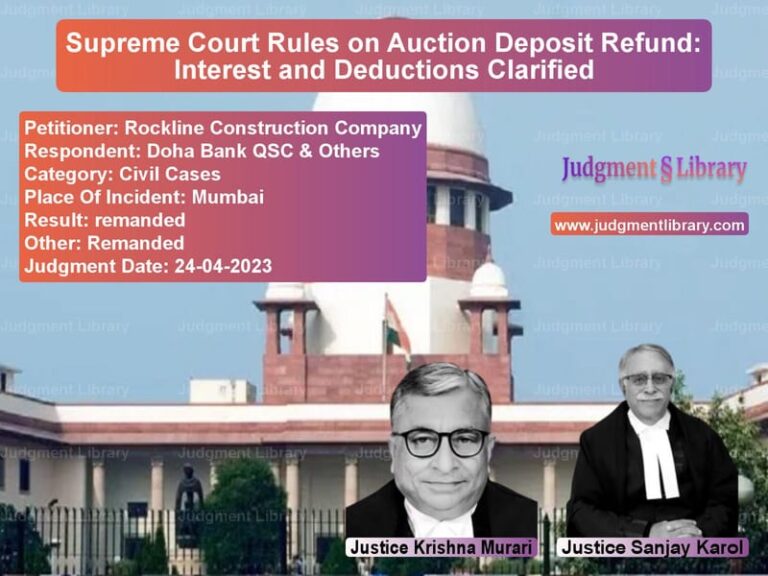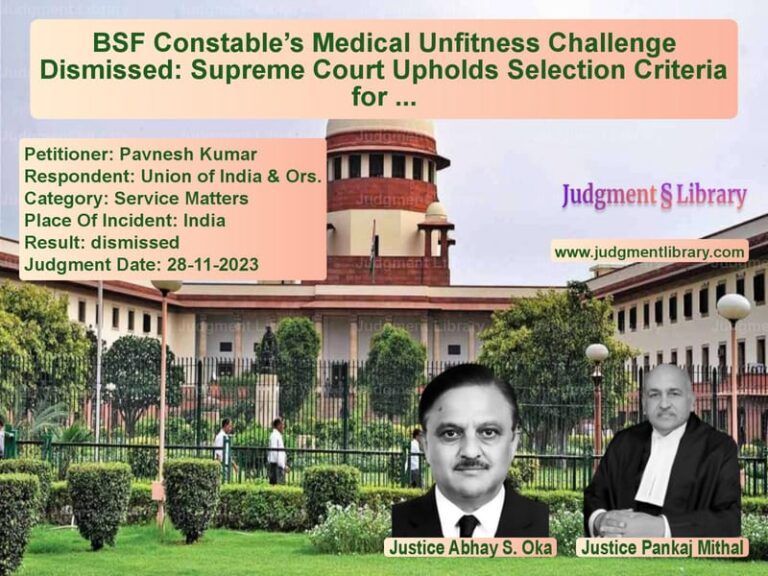Ashok Verma vs. State of Chhattisgarh: Supreme Court Upholds Conviction in Dowry Death Case
The case of Ashok Verma vs. State of Chhattisgarh is a significant Supreme Court ruling that addresses the interpretation of dowry-related offenses, domestic violence, and circumstantial evidence under the Indian Penal Code (IPC). The conviction of the appellant under Section 302 IPC (Murder), Section 201 IPC (Causing Disappearance of Evidence), and Section 498A IPC (Cruelty by Husband) brings to light the legal aspects of domestic violence, evidence manipulation, and the responsibility of an accused in explaining the circumstances leading to an unnatural death within the matrimonial home.
Background of the Case
The tragic death of Smt. Pushpa, the wife of Ashok Verma, occurred on January 26, 2012, within the confines of her matrimonial home, merely 50 meters away from her paternal residence. The couple had been married since 2006. The prosecution alleged that the appellant was heavily involved in gambling and had pawned his wife’s jewelry to fund his addiction. Furthermore, he was accused of mentally and physically abusing her throughout their marital life.
On the fateful day, Pushpa was found dead inside the house. The appellant informed her family that she had hanged herself. However, the post-mortem report suggested that her death was caused by strangulation, leading to suspicions of homicide. The prosecution argued that the accused had not only killed his wife but had also attempted to stage her death as suicide to evade legal consequences.
Trial Court’s Findings
The Sessions Court found the appellant guilty based on circumstantial evidence, witness testimonies, and forensic findings. The court sentenced him as follows:
- Life imprisonment under Section 302 IPC (Murder) with a fine of ₹1,000.
- Three years rigorous imprisonment under Section 201 IPC (Causing Disappearance of Evidence) with a fine of ₹500.
- One-year rigorous imprisonment under Section 498A IPC (Cruelty by Husband) with a fine of ₹500.
All sentences were to run concurrently.
High Court’s Decision
Upon appeal, the Chhattisgarh High Court upheld the trial court’s findings, concluding that the prosecution had proved its case beyond reasonable doubt. The court emphasized that the circumstantial evidence and witness testimonies overwhelmingly pointed toward the appellant’s guilt.
Arguments by the Appellant
The defense argued the following points:
- The appellant had an alibi that was not adequately considered by the courts.
- The absence of a fractured hyoid bone indicated suicide rather than homicide.
- There was no direct eyewitness testimony linking the appellant to the alleged crime.
- The appellant had attempted to rescue his wife and took her to the hospital.
Arguments by the Respondent
The prosecution countered these arguments by stating:
- The death was a case of homicide and not suicide, as confirmed by the post-mortem report.
- The appellant had a history of domestic violence against the deceased.
- The forensic findings, including signs of strangulation, pointed to deliberate killing.
- The appellant’s contradictory statements and his failure to explain his wife’s injuries worked against him.
Supreme Court’s Analysis
The Supreme Court meticulously examined the evidence and testimonies. The following points were crucial in establishing the appellant’s guilt:
- The testimony of PW-8 Aarti, the deceased’s sister, confirmed that Pushpa had been subjected to frequent beatings and had complained about her husband’s violent behavior.
- The forensic report explicitly stated that the cause of death was strangulation, ruling out suicide.
- The appellant failed to provide a reasonable explanation for the cause of injuries found on the deceased’s body.
The court emphasized:
“The appellant’s failure to explain the circumstances of the death of his wife, when it occurred within the confines of his home, leads to an adverse inference against him.”
Final Judgment
After reviewing all the evidence, the Supreme Court ruled:
- The plea of alibi was baseless, as the appellant was present at the scene.
- The forensic and circumstantial evidence pointed overwhelmingly to homicide.
- The conviction and sentences under Sections 302, 201, and 498A IPC were upheld.
Conclusion
The ruling in this case reinforces the principle that domestic violence leading to unnatural death will not go unpunished. The judgment highlights the significance of forensic evidence and the responsibility of the accused to explain incidents occurring within their home. This decision also sets a precedent for future cases involving dowry deaths, domestic abuse, and circumstantial evidence in homicide cases.
Petitioner Name: Ashok Verma.Respondent Name: State of Chhattisgarh.Judgment By: Justice C.T. Ravikumar, Justice Prashant Kumar Mishra.Place Of Incident: Chhattisgarh.Judgment Date: 18-12-2024.
Don’t miss out on the full details! Download the complete judgment in PDF format below and gain valuable insights instantly!
Download Judgment: ashok-verma-vs-state-of-chhattisgar-supreme-court-of-india-judgment-dated-18-12-2024.pdf
Directly Download Judgment: Directly download this Judgment
See all petitions in Murder Cases
See all petitions in Domestic Violence
See all petitions in Dowry Cases
See all petitions in Judgment by C.T. Ravikumar
See all petitions in Judgment by Prashant Kumar Mishra
See all petitions in dismissed
See all petitions in supreme court of India judgments December 2024
See all petitions in 2024 judgments
See all posts in Criminal Cases Category
See all allowed petitions in Criminal Cases Category
See all Dismissed petitions in Criminal Cases Category
See all partially allowed petitions in Criminal Cases Category







